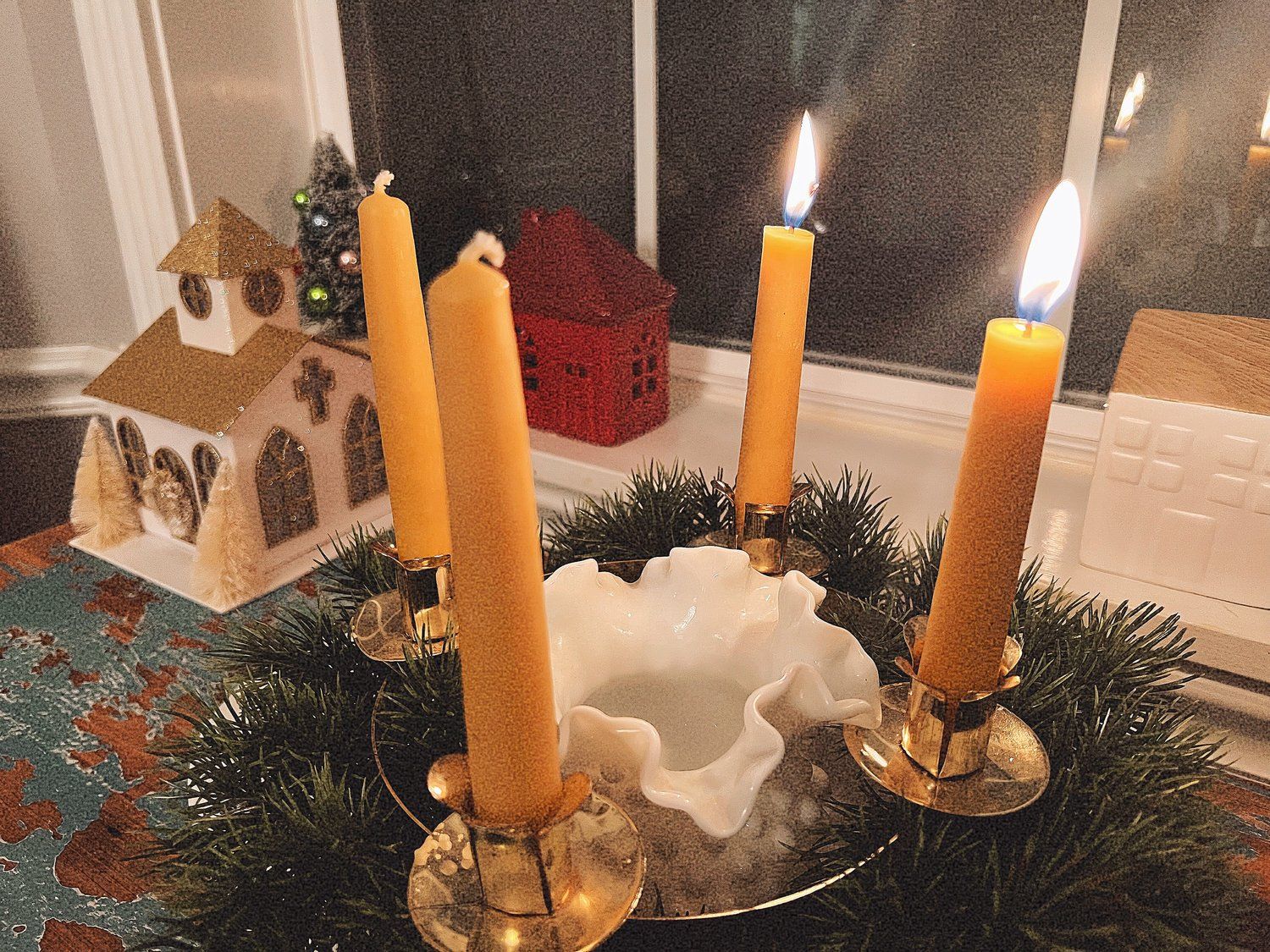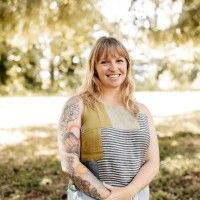The Theology of Wonder
Dec 19
/
Heather Mayer

During this Advent season, I have been writing daily about things that bring an unexpected smile to my lips. I am a preschool teacher, so most often, the moments that stand out are ones of four-year-old humor or something like it. But this season has also been one full of illness, so there have been days where gratitude was in the relief of a warm bath or the miracle of finding cough syrup on bare drugstore shelves. It has been a fruitful discipline of recognizing how the seemingly trivial mercies are the very ones that accumulate into a life rich with joy.
Recently I was introduced to the works of Ross Gay, a poet and the author of The Books of Delights and Inciting Joy. He is a self-proclaimed student of joy, an avid gardener, and a human of boundless curiosity. His noticings and devout determination to delight in the details of his world are so kindred to my soul. But the subjects of his joy are not always the most popular or obvious. Often, the subjects of delight he writes about are the violent nature of the praying mantis, the darkness of his dreams, and the loss of a family member. This is precisely why he is worth talking about when discussing a discipline of wonder or delight. As our lives pass and the stuff life is made of becomes more complex, more fraught with loss and challenge, and our eyes are ever-exposed to the gritty and the raw, we must cultivate the capacity to find joy in the unexpected.
I am admittedly an optimist. I’m not sure which precedes the other in my life: the ability to appreciate the small stuff or the necessity to look at the world with fondness. I can always find something redeemable even in the harshest of the real. The practice of rose-colored noticing is not just a life-saving technique for my mental and emotional health; it is also deeply spiritual.
For some time, I have referred to my spirituality as a theology of wonder. And while that might sound flimsy or too attached to feeling, it has roots that extend deep into a well of experience and peace. When talking about Jesus in her book “Freeing Jesus,” Diana Butler Bass writes that she still remembers what it felt like to learn that Jesus wanted to be her friend. The best friends of my early childhood were privy to the most honest depths of who I was and still am. They knew my dreams and interests more than anyone else because they saw me in play, which tends to be our truest and most vulnerable self. Play is one of our first human languages and one of the first ways we experience connection. Only recently have I recognized the deeply imaginative play memories from my childhood as the first God moments. They were times spent in wonder and joy, where I was intimately accompanied by God. In my imaginative play, my soul was captivated, held, and loved by a God I experienced as fueling my creativity and playing right along with me. Those moments were imbibed with safety, and I sank into them deeply as I connected to the divine.
I like to ask my spiritual directees this question: “When was the last time you had fun?” I believe the ability to experience joy is linked to our ability to engage with wonder- wonder about God in us, God in the universe, and the miraculous connection between everything that holds the spark of life.
The challenge with this recognition of childhood oneness with God and vulnerability of self is figuring out how to access it in adulthood. One of the best ways to start is to talk about fun. To get to the heart of fun, we must know ourselves well enough to recognize what lights us up now and remember who we were as children when play was instinctual. This is where all that talk of noticing comes in. Fun actions do not necessarily equate fun. I know dozens of people who struggle in this realm of fun and have gone out to buy roller skates, thinking it would give them that magic “something” their heart was after. But as Catherine Price talks about in her recent TED Talk titled “Why Having Fun Is the Secret to a Healthier Life,” fun exists at the intersection of Playfulness, Connection, and Flow. Playfulness can be playing with flavors while creating a new recipe. Flow can be found on a hike, playing golf, or writing poetry. And connection is bringing that sense of goodness into the realm of your relationships.
This Advent, I would like to invite you into curiosity about what makes your soul feel closest to God. Is it the sunrise or the sunset, and why one over the other? Are they the moments of quiet first thing in the morning or voices around the dinner table? The drippy warmth of the advent candle’s wax or the sweet scent of pine from the wreaths on the doors? Those moments of beauty, whether obvious or obscure, point you toward the formation of your soul and its union with the Creator.
Last night I flew back from New York City with my husband. We were supposed to leave Newark at 6:30pm, and after many delays, our flight finally took off after 11pm. It was a packed flight to get us back to Portland, Oregon, and folks on board were tired and on edge. I am a fabulous sleeper in every situation except on airplanes. So two hours in, while my spouse and the seat companion to my right both slept soundly, I was awake when a younger woman across the aisle started having a panic attack. She was flying with her mother, who appeared to be versed in managing the sudden and intense stress episode. I watched her work with two flight attendants who dipped cloths in cups of cool water and gently placed them across the woman’s chest and neck. The mother fanned her with an airline safety leaflet and encouraged her to rest her head on the seat in front of her while taking deep breaths. She eventually fell asleep, and not until then did her mother stop watching her.
Yesterday my soul bore witness to centuries-old churches, white Christmas lights in the rain, and a tiny bookstore in Chelsea with patrons asking one another for reading recommendations. Yet, the care that the mother and flight attendants took in a woman’s moment of challenge was the one to crack me open with its beauty.
If you are interested in learning more, I invite you to join me for my four-week course, Opening Your Story. Join me virtually on Fridays from January 27th-February 17th from 12:30-1:30pm.
Each of us lives out multiple stories through the course of our lives. This class is the first in a series of three that will allow each participant to engage with the set of narratives you carry into the world. Through archetypal language, the Enneagram, creative writing, visual prompts, and poetry, you will be invited to dive into the unique life you are living, allowing you to hone in on the themes of beauty that you have to offer yourself and the world.

Heather Mayer
Heather is a trauma-informed Spiritual Director and a seeker of those moments that thin the veil. She holds an undergraduate degree in psychology from the University of Oregon, a Master’s in Spiritual Formation from George Fox Seminary, and is a certified Spiritual Director through Portland Seminary. In the vein of “everything is spiritual”, Heather is also a preschool director and teacher. Her approach to early childhood is the same approach she takes in spiritual direction- that all persons carry the image and the wisdom of God within and that our intimacy with God can grow when we are encouraged to approach spirituality with curiosity and wonder. Heather finds her deepest connection with Creator God in nature and in the presence of children and animals. Her call to spiritual direction lives in her desire for all God’s children to know and trust in their belovedness. In spiritual direction sessions, she delights in helping people learn to trust the voice of God within that says we never have to betray who we are in order to be loved and cherished by God. When she is not teaching or directing, you can find Heather writing for Cascade Portland’s church newsletter, playing with her two kids, hiking with her dogs, or going on concert dates with her husband. She is a fan of trying as many new restaurants as possible, trips to the coast, long Sunday outdoor runs, and a good book.
Heather is a trauma-informed Spiritual Director and a seeker of those moments that thin the veil. She holds an undergraduate degree in psychology from the University of Oregon, a Master’s in Spiritual Formation from George Fox Seminary, and is a certified Spiritual Director through Portland Seminary. In the vein of “everything is spiritual”, Heather is also a preschool director and teacher. Her approach to early childhood is the same approach she takes in spiritual direction- that all persons carry the image and the wisdom of God within and that our intimacy with God can grow when we are encouraged to approach spirituality with curiosity and wonder. Heather finds her deepest connection with Creator God in nature and in the presence of children and animals. Her call to spiritual direction lives in her desire for all God’s children to know and trust in their belovedness. In spiritual direction sessions, she delights in helping people learn to trust the voice of God within that says we never have to betray who we are in order to be loved and cherished by God. When she is not teaching or directing, you can find Heather writing for Cascade Portland’s church newsletter, playing with her two kids, hiking with her dogs, or going on concert dates with her husband. She is a fan of trying as many new restaurants as possible, trips to the coast, long Sunday outdoor runs, and a good book.
Connect with Heather by emailing her at heather.michelle.mayer@gmail.com.
https://heathermayer.org/

